SEO
21 Great Search Engines You Can Use Instead Of Google

For the last 20 years, Google has been the search engine that most people use for everyday searches, product research, and staying up to date on the latest news.
With its long-standing domination and majority market share, it’s been hard to argue that any search engine serves up better results than Google.
Because of this market dominance, Google has also been the main search engine of focus for SEO and marketing professionals.
However, since the introduction of ChatGPT, Google Founders, Larry Page and Sergey Brin, are paying attention to OpenAI and the potential it has to revolutionize search.
Despite having years of artificial intelligence (AI) development behind them, it is unknown if Google can beat its top U.S. rival Bing to market with an AI chatbot.
Even if Bing is the first major search engine to market with AI, Google’s search engine dominance gives it a huge advantage.
The next few years in search engine development will certainly be interesting.
No matter what happens, there are still several specialty search engines that offer a superior search experience over Google – and it pays to be aware of what else is out there.
Here are 21 of the best alternative search engines you can try.
An AI-Powered Search Engine
1. You.com
You.com is an AI-powered search engine founded by Richard Socher, a prominent natural language processing (NLP) researcher and former chief scientist of Salesforce.
The site operates in two modes: a personal mode and a private mode.
In personal mode, users can configure their own source preferences. While in private mode, they enjoy a completely untraceable experience; no telemetry data is recorded.
The company also offers YouCode, an AI-powered coding assistant, and YouWrite, an AI writing assistant.
The open search platform encourages developers to build apps and contribute to a more open and collaborative internet.
A Revenue-Sharing Search Engine
2. Yep.com
 Screenshot from Yep.com, February 2023
Screenshot from Yep.com, February 2023Yep.com (by Ahrefs) promotes itself as being a search engine with a difference.
It is designed to directly reward and compensate content creators by using a 90/10 revenue share business model.
This means that 90% of all advertising revenue goes directly to the creators of content, allowing them to earn money for their work.
In addition, this business model allows users to directly support their favorite content creators and ensures that content creators are fairly compensated.
A Copyright-Free Search Engine
3. Openverse
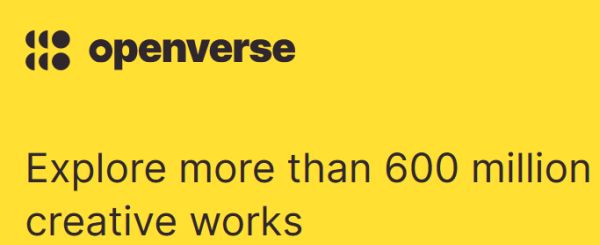 Screenshot from openverse.com, February 2023
Screenshot from openverse.com, February 2023Openverse should be your first stop on the hunt for nearly any type of copyright-free content.
This search engine is perfect if you need music for a video, an image for a blog post, or anything else without worrying about angry artists coming after you for ripping off their work.
Mainstream Search Engines
Mainstream search engines are the Google alternatives that have managed to maintain a modest market share over the past several years.
They may also be in the best position to regain lost market share for the first time in years – but only if they played the AI card better than Google.
4. Bing.com
 Screenshot from Bing, February 2023
Screenshot from Bing, February 2023As of January 2022, Microsoft sites handled a quarter of all search queries in the United States.
One could argue that Bing outperforms Google in certain respects.
For starters, Bing has a rewards program that allows one to accumulate points while searching. These points are redeemable at the Microsoft and Windows stores, which is a nice perk.
In my view, the Bing visual search API is superior to its rivals and much more intuitive.
Bing carries that same clean user experience to video, making it the go-to source for video searches without a YouTube bias.
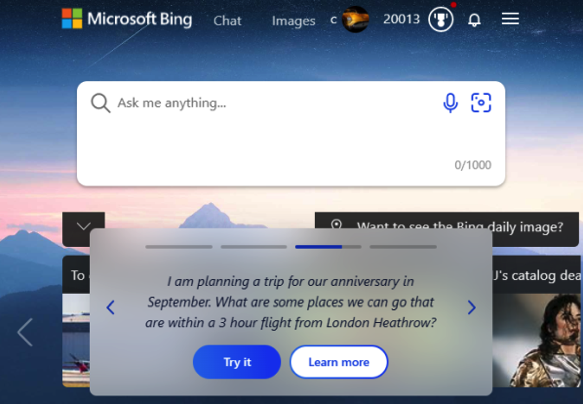 Screenshot from Bing.com, February 2023
Screenshot from Bing.com, February 2023On February 7, 2023, Bing announced an all-new, AI-powered version of its search engine and Edge browser. The stated goal is to “deliver better search, more complete answers, a new chat experience, and the ability to generate content.”
According to Satya Nadella, chairman and CEO of Microsoft, there are 5 billion search queries a day that go unanswered. Bing is looking to fill that void.
5. Yahoo.com
 Screenshot from Yahoo.com, February 2023
Screenshot from Yahoo.com, February 2023As of January 2022, Yahoo.com (Verizon Media) had a search market share of 11.2%.
Yahoo’s strength is in diversification by offering services like email, news, finance, and more in addition to search.
Yahoo has been innovating and evolving for more than two decades.
It made a cryptic tweet on January 20 about making search cool again, but did not take me up on my request to explain what that means.
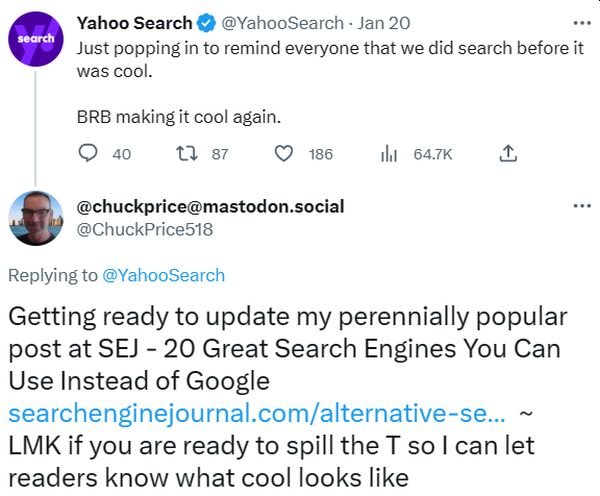 Screenshot from Twitter, February 2023
Screenshot from Twitter, February 2023Privacy-Focused Search Engines
Privacy is an increasingly important issue among internet users.
Privacy-focused search engines prioritize users’ privacy, and their appeal is that they do not track users’ activities or collect personal data.
Some of the most popular include:
6. DuckDuckGo
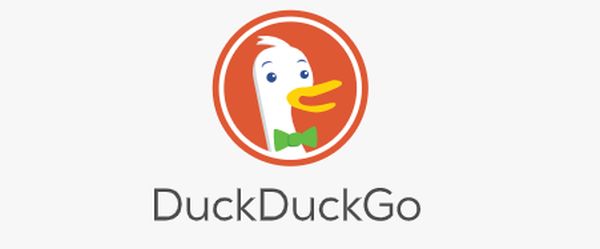 Screenshot from DuckDuckGo, February 2023
Screenshot from DuckDuckGo, February 2023DuckDuckGo is a search engine that could also fit into the mainstream category, but the primary “selling feature” is that it doesn’t collect or store any of your personal information.
That means you can run your searches in peace without having to worry about the boogeyman watching you through your computer screen.
DuckDuckGo is the perfect choice for those who wish to keep their browsing habits and personal information private.
DuckDuckGo Lite is the mobile version.
7. Startpage

Startpage serves up answers from Google.
It’s the perfect choice for those who prefer Google’s search results but aren’t keen on having their search history tracked and stored.
It also includes a URL generator, proxy service, and HTTPS support.
The URL generator is especially useful because it eliminates the need to collect cookies. Instead, it remembers your settings in a way that promotes privacy.
8. Swisscows
 Screenshot from Swisscows.com, February 2023
Screenshot from Swisscows.com, February 2023Swisscows is a unique option on this list, billing itself as a family-friendly semantic search engine.
It also prides itself on respecting users’ privacy, never collecting, storing, or tracking data.
It uses artificial intelligence to determine the context of a user’s query.
Over time, Swisscows promises to answer your questions with surprising accuracy.
9. Gibiru
 Screenshot from Gibiru.com, February 2023
Screenshot from Gibiru.com, February 2023According to its website, Gibiru features “Uncensored Private Search” with no retargeting and no selling of private data.
It claims its search results are sourced from a modified Google algorithm, so users are able to query the information they seek without worrying about Google’s tracking activities.
Because Gibiru doesn’t install tracking cookies on your computer, it purports to be faster than “NSA (National Security Agency) Search Engines.”
Knowledge-Based Search Engines
10. Wiki.com
 Screenshot from Wiki.com, February 2023
Screenshot from Wiki.com, February 2023Wiki.com pulls its results from thousands of wikis on the net.
It is the perfect search engine for those who appreciate community-led information, as found on sites like Wikipedia.
11. Twitter
 Screenshot from Twitter, February 2023
Screenshot from Twitter, February 2023Twitter is hard to beat as a real-time search engine.
It’s the perfect place to go for minute-by-minute updates in case of an emergency.
Google will catch up eventually, but nothing beats a tweet in the heat of the moment.
To make the most of it, check out our guide to Twitter Advanced Search.
12. SlideShare
SlideShare allows you to search for documented slideshow presentations.
You can also search for ebooks and PDFs, making it an excellent tool if you have a business presentation to prepare for.
SlideShare also allows you to save slides and even download the entire slideshow for use on your local computer.
13. Wayback Machine
 Screenshot from archive.com, February 2023
Screenshot from archive.com, February 2023Internet Archive, a.k.a. the Wayback Machine, is great for researching old websites, but it’s so much more.
As the name implies, this search engine queries a massive collection of documented material, including millions of free videos, books, music, and software.
Essentially, the Internet Archive is a vast online library where you can access just about anything you could imagine.
Browser-Based Search
14. Brave
 Screenshot from Brave.com, February 2023
Screenshot from Brave.com, February 2023Brave is a privacy-focused web browser that blocks trackers and ads and provides private search and browsing by default.
It features free video calls, offline playlists, and a customizable news feed.
Advanced security features like IPFS integration, Tor (Onion Routing), and a crypto wallet are also available.
Brave offers rewards for opting into privacy-preserving ads. It claims over 50 million people use its browser for a faster and safer web experience.
15. Neeva
 Screenshot from Neeva.com, February 2023
Screenshot from Neeva.com, February 2023Neeva offers a browser extension that provides a private, ad-free, and customizable experience.
It allows users to customize their search results by choosing preferred retailers and news sources and provides expert-recommended shopping results.
Neeva even provides recipe results with filters for cook time, ingredients, and reviews.
Neeva says it never sells or shares users’ data.
Specialized Search Engines
Specialized search engines cater to particular needs, providing results based on specific criteria. For example:
16. WolframAlpha
 Screenshot from WolframAlpha.com, February 2023
Screenshot from WolframAlpha.com, February 2023WolframAlpha is a computational knowledge engine that allows you to compute answers to problems and search through expert-level data on a variety of subjects, from algebra to words and linguistics.
It also offers Pro features for individuals, students, and educators that need professional-grade computation and analysis of imported data.
Pricing starts at $5.49 per month.
17. searX
 Screenshot from searX, February 2023
Screenshot from searX, February 2023searX is a free, open-source metasearch engine that provides search results from multiple sources, without tracking the user’s activities.
It is open-source and can be added to a browser’s search bar, or set as the default search engine.
Privacy is maintained by mixing queries with searches on other platforms and never storing search data.
International Search Engines
International search engines cater to specific regions and provide results based on local language and culture.
Some popular international search engines include:
18. Baidu
 Screenshot from Baidu, February 2023
Screenshot from Baidu, February 2023Baidu is the largest search engine in China and has a 65% market share.
Like Google, it offers a broad range of services including maps, music, videos, and an app store.
Baidu also has a mobile browser and mobile app.
19. Yandex
 Screenshot from Yandex, February 2023
Screenshot from Yandex, February 2023Yandex is used by more than 54% of Russian internet users. It is also used in Belarus, Kazakhstan, Turkey, and Ukraine.
Yandex is an overall easy-to-use search engine.
As a bonus, it offers a suite of some pretty cool tools.
It had a data leak in January 2023, leaving many speculating about the relevance of what was revealed.
20. Sogou
 Screenshot from Sogou, February 2023
Screenshot from Sogou, February 2023Sogou is a Chinese search engine that is growing in popularity.
Sogou Search is an interactive search engine, supporting WeChat, article search, English search and translation, and more.
It prides itself on providing users with professional, accurate, and convenient search through self-developed artificial intelligence algorithms.
21. Naver
 Naver is the largest search engine in South Korea, offering a range of services including blogs, news, music, and shopping.
Naver is the largest search engine in South Korea, offering a range of services including blogs, news, music, and shopping.
It also has a mobile app for searching on the go.
Naver is a great option for those looking for a search engine tailored to the Korean market.
The Takeaway
Google may be the most popular choice in search engines, but it may not always be the best choice, depending on your needs and priorities.
Alternative search engines can offer a wide range of benefits, including a better search experience and higher levels of privacy.
Keep in mind the impact of artificial intelligence on search is still largely unknown and may profoundly impact the accuracy and relevance of search results in the future.
Nonetheless, do yourself a favor and give some of these a try.
More Resources:
Featured Image: Masson/Shutterstock
SEO
Google Clarifies Vacation Rental Structured Data

Google’s structured data documentation for vacation rentals was recently updated to require more specific data in a change that is more of a clarification than it is a change in requirements. This change was made without any formal announcement or notation in the developer pages changelog.
Vacation Rentals Structured Data
These specific structured data types makes vacation rental information eligible for rich results that are specific to these kinds of rentals. However it’s not available to all websites. Vacation rental owners are required to be connected to a Google Technical Account Manager and have access to the Google Hotel Center platform.
VacationRental Structured Data Type Definitions
The primary changes were made to the structured data property type definitions where Google defines what the required and recommended property types are.
The changes to the documentation is in the section governing the Recommended properties and represents a clarification of the recommendations rather than a change in what Google requires.
The primary changes were made to the structured data type definitions where Google defines what the required and recommended property types are.
The changes to the documentation is in the section governing the Recommended properties and represents a clarification of the recommendations rather than a change in what Google requires.
Address Schema.org property
This is a subtle change but it’s important because it now represents a recommendation that requires more precise data.
This is what was recommended before:
“streetAddress”: “1600 Amphitheatre Pkwy.”
This is what it now recommends:
“streetAddress”: “1600 Amphitheatre Pkwy, Unit 6E”
Address Property Change Description
The most substantial change is to the description of what the “address” property is, becoming more descriptive and precise about what is recommended.
The description before the change:
PostalAddress
Information about the street address of the listing. Include all properties that apply to your country.
The description after the change:
PostalAddress
The full, physical location of the vacation rental.
Provide the street address, city, state or region, and postal code for the vacation rental. If applicable, provide the unit or apartment number.
Note that P.O. boxes or other mailing-only addresses are not considered full, physical addresses.
This is repeated in the section for address.streetAddress property
This is what it recommended before:
address.streetAddress Text
The full street address of your vacation listing.
And this is what it recommends now:
address.streetAddress Text
The full street address of your vacation listing, including the unit or apartment number if applicable.
Clarification And Not A Change
Although these updates don’t represent a change in Google’s guidance they are nonetheless important because they offer clearer guidance with less ambiguity as to what is recommended.
Read the updated structured data guidance:
Vacation rental (VacationRental) structured data
Featured Image by Shutterstock/New Africa
SEO
Google On Hyphens In Domain Names
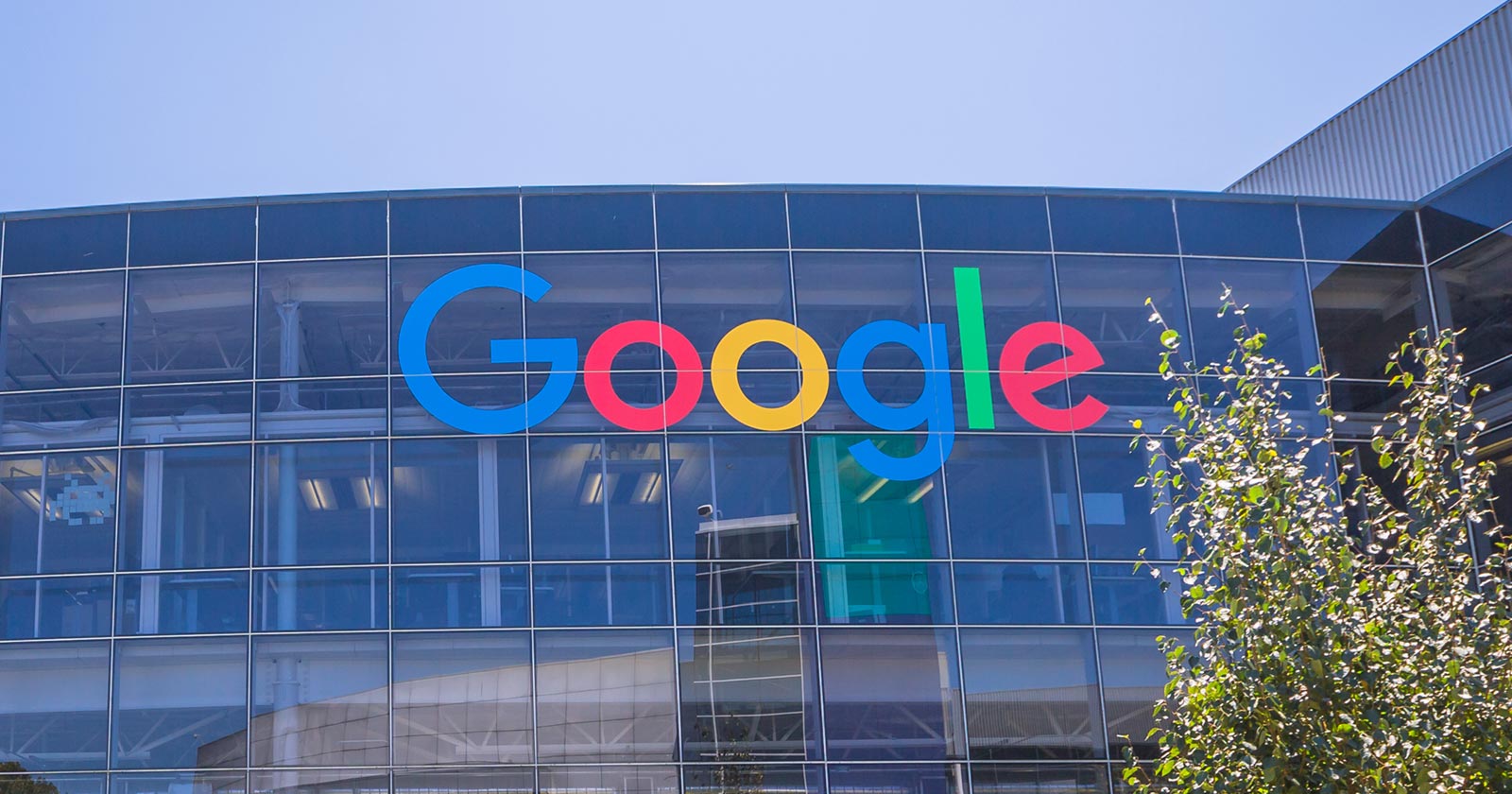
Google’s John Mueller answered a question on Reddit about why people don’t use hyphens with domains and if there was something to be concerned about that they were missing.
Domain Names With Hyphens For SEO
I’ve been working online for 25 years and I remember when using hyphens in domains was something that affiliates did for SEO when Google was still influenced by keywords in the domain, URL, and basically keywords anywhere on the webpage. It wasn’t something that everyone did, it was mainly something that was popular with some affiliate marketers.
Another reason for choosing domain names with keywords in them was that site visitors tended to convert at a higher rate because the keywords essentially prequalified the site visitor. I know from experience how useful two-keyword domains (and one word domain names) are for conversions, as long as they didn’t have hyphens in them.
A consideration that caused hyphenated domain names to fall out of favor is that they have an untrustworthy appearance and that can work against conversion rates because trustworthiness is an important factor for conversions.
Lastly, hyphenated domain names look tacky. Why go with tacky when a brandable domain is easier for building trust and conversions?
Domain Name Question Asked On Reddit
This is the question asked on Reddit:
“Why don’t people use a lot of domains with hyphens? Is there something concerning about it? I understand when you tell it out loud people make miss hyphen in search.”
And this is Mueller’s response:
“It used to be that domain names with a lot of hyphens were considered (by users? or by SEOs assuming users would? it’s been a while) to be less serious – since they could imply that you weren’t able to get the domain name with fewer hyphens. Nowadays there are a lot of top-level-domains so it’s less of a thing.
My main recommendation is to pick something for the long run (assuming that’s what you’re aiming for), and not to be overly keyword focused (because life is too short to box yourself into a corner – make good things, course-correct over time, don’t let a domain-name limit what you do online). The web is full of awkward, keyword-focused short-lived low-effort takes made for SEO — make something truly awesome that people will ask for by name. If that takes a hyphen in the name – go for it.”
Pick A Domain Name That Can Grow
Mueller is right about picking a domain name that won’t lock your site into one topic. When a site grows in popularity the natural growth path is to expand the range of topics the site coves. But that’s hard to do when the domain is locked into one rigid keyword phrase. That’s one of the downsides of picking a “Best + keyword + reviews” domain, too. Those domains can’t grow bigger and look tacky, too.
That’s why I’ve always recommended brandable domains that are memorable and encourage trust in some way.
Read the post on Reddit:
Read Mueller’s response here.
Featured Image by Shutterstock/Benny Marty
SEO
Reddit Post Ranks On Google In 5 Minutes

Google’s Danny Sullivan disputed the assertions made in a Reddit discussion that Google is showing a preference for Reddit in the search results. But a Redditor’s example proves that it’s possible for a Reddit post to rank in the top ten of the search results within minutes and to actually improve rankings to position #2 a week later.
Discussion About Google Showing Preference To Reddit
A Redditor (gronetwork) complained that Google is sending so many visitors to Reddit that the server is struggling with the load and shared an example that proved that it can only take minutes for a Reddit post to rank in the top ten.
That post was part of a 79 post Reddit thread where many in the r/SEO subreddit were complaining about Google allegedly giving too much preference to Reddit over legit sites.
The person who did the test (gronetwork) wrote:
“…The website is already cracking (server down, double posts, comments not showing) because there are too many visitors.
…It only takes few minutes (you can test it) for a post on Reddit to appear in the top ten results of Google with keywords related to the post’s title… (while I have to wait months for an article on my site to be referenced). Do the math, the whole world is going to spam here. The loop is completed.”
Reddit Post Ranked Within Minutes
Another Redditor asked if they had tested if it takes “a few minutes” to rank in the top ten and gronetwork answered that they had tested it with a post titled, Google SGE Review.
gronetwork posted:
“Yes, I have created for example a post named “Google SGE Review” previously. After less than 5 minutes it was ranked 8th for Google SGE Review (no quotes). Just after Washingtonpost.com, 6 authoritative SEO websites and Google.com’s overview page for SGE (Search Generative Experience). It is ranked third for SGE Review.”
It’s true, not only does that specific post (Google SGE Review) rank in the top 10, the post started out in position 8 and it actually improved ranking, currently listed beneath the number one result for the search query “SGE Review”.
Screenshot Of Reddit Post That Ranked Within Minutes
Anecdotes Versus Anecdotes
Okay, the above is just one anecdote. But it’s a heck of an anecdote because it proves that it’s possible for a Reddit post to rank within minutes and get stuck in the top of the search results over other possibly more authoritative websites.
hankschrader79 shared that Reddit posts outrank Toyota Tacoma forums for a phrase related to mods for that truck.
Google’s Danny Sullivan responded to that post and the entire discussion to dispute that Reddit is not always prioritized over other forums.
Danny wrote:
“Reddit is not always prioritized over other forums. [super vhs to mac adapter] I did this week, it goes Apple Support Community, MacRumors Forum and further down, there’s Reddit. I also did [kumo cloud not working setup 5ghz] recently (it’s a nightmare) and it was the Netgear community, the SmartThings Community, GreenBuildingAdvisor before Reddit. Related to that was [disable 5g airport] which has Apple Support Community above Reddit. [how to open an 8 track tape] — really, it was the YouTube videos that helped me most, but it’s the Tapeheads community that comes before Reddit.
In your example for [toyota tacoma], I don’t even get Reddit in the top results. I get Toyota, Car & Driver, Wikipedia, Toyota again, three YouTube videos from different creators (not Toyota), Edmunds, a Top Stories unit. No Reddit, which doesn’t really support the notion of always wanting to drive traffic just to Reddit.
If I guess at the more specific query you might have done, maybe [overland mods for toyota tacoma], I get a YouTube video first, then Reddit, then Tacoma World at third — not near the bottom. So yes, Reddit is higher for that query — but it’s not first. It’s also not always first. And sometimes, it’s not even showing at all.”
hankschrader79 conceded that they were generalizing when they wrote that Google always prioritized Reddit. But they also insisted that that didn’t diminish what they said is a fact that Google’s “prioritization” forum content has benefitted Reddit more than actual forums.
Why Is The Reddit Post Ranked So High?
It’s possible that Google “tested” that Reddit post in position 8 within minutes and that user interaction signals indicated to Google’s algorithms that users prefer to see that Reddit post. If that’s the case then it’s not a matter of Google showing preference to Reddit post but rather it’s users that are showing the preference and the algorithm is responding to those preferences.
Nevertheless, an argument can be made that user preferences for Reddit can be a manifestation of Familiarity Bias. Familiarity Bias is when people show a preference for things that are familiar to them. If a person is familiar with a brand because of all the advertising they were exposed to then they may show a bias for the brand products over unfamiliar brands.
Users who are familiar with Reddit may choose Reddit because they don’t know the other sites in the search results or because they have a bias that Google ranks spammy and optimized websites and feel safer reading Reddit.
Google may be picking up on those user interaction signals that indicate a preference and satisfaction with the Reddit results but those results may simply be biases and not an indication that Reddit is trustworthy and authoritative.
Is Reddit Benefiting From A Self-Reinforcing Feedback Loop?
It may very well be that Google’s decision to prioritize user generated content may have started a self-reinforcing pattern that draws users in to Reddit through the search results and because the answers seem plausible those users start to prefer Reddit results. When they’re exposed to more Reddit posts their familiarity bias kicks in and they start to show a preference for Reddit. So what could be happening is that the users and Google’s algorithm are creating a self-reinforcing feedback loop.
Is it possible that Google’s decision to show more user generated content has kicked off a cycle where more users are exposed to Reddit which then feeds back into Google’s algorithm which in turn increases Reddit visibility, regardless of lack of expertise and authoritativeness?
Featured Image by Shutterstock/Kues
-

 WORDPRESS6 days ago
WORDPRESS6 days agoTurkish startup ikas attracts $20M for its e-commerce platform designed for small businesses
-

 PPC7 days ago
PPC7 days ago31 Ready-to-Go Mother’s Day Messages for Social Media, Email, & More
-

 PPC6 days ago
PPC6 days agoA History of Google AdWords and Google Ads: Revolutionizing Digital Advertising & Marketing Since 2000
-

 MARKETING5 days ago
MARKETING5 days agoRoundel Media Studio: What to Expect From Target’s New Self-Service Platform
-

 SEO5 days ago
SEO5 days agoGoogle Limits News Links In California Over Proposed ‘Link Tax’ Law
-

 MARKETING6 days ago
MARKETING6 days agoUnlocking the Power of AI Transcription for Enhanced Content Marketing Strategies
-

 SEARCHENGINES6 days ago
SEARCHENGINES6 days agoGoogle Search Results Can Be Harmful & Dangerous In Some Cases
-
SEARCHENGINES5 days ago
Daily Search Forum Recap: April 12, 2024













You must be logged in to post a comment Login